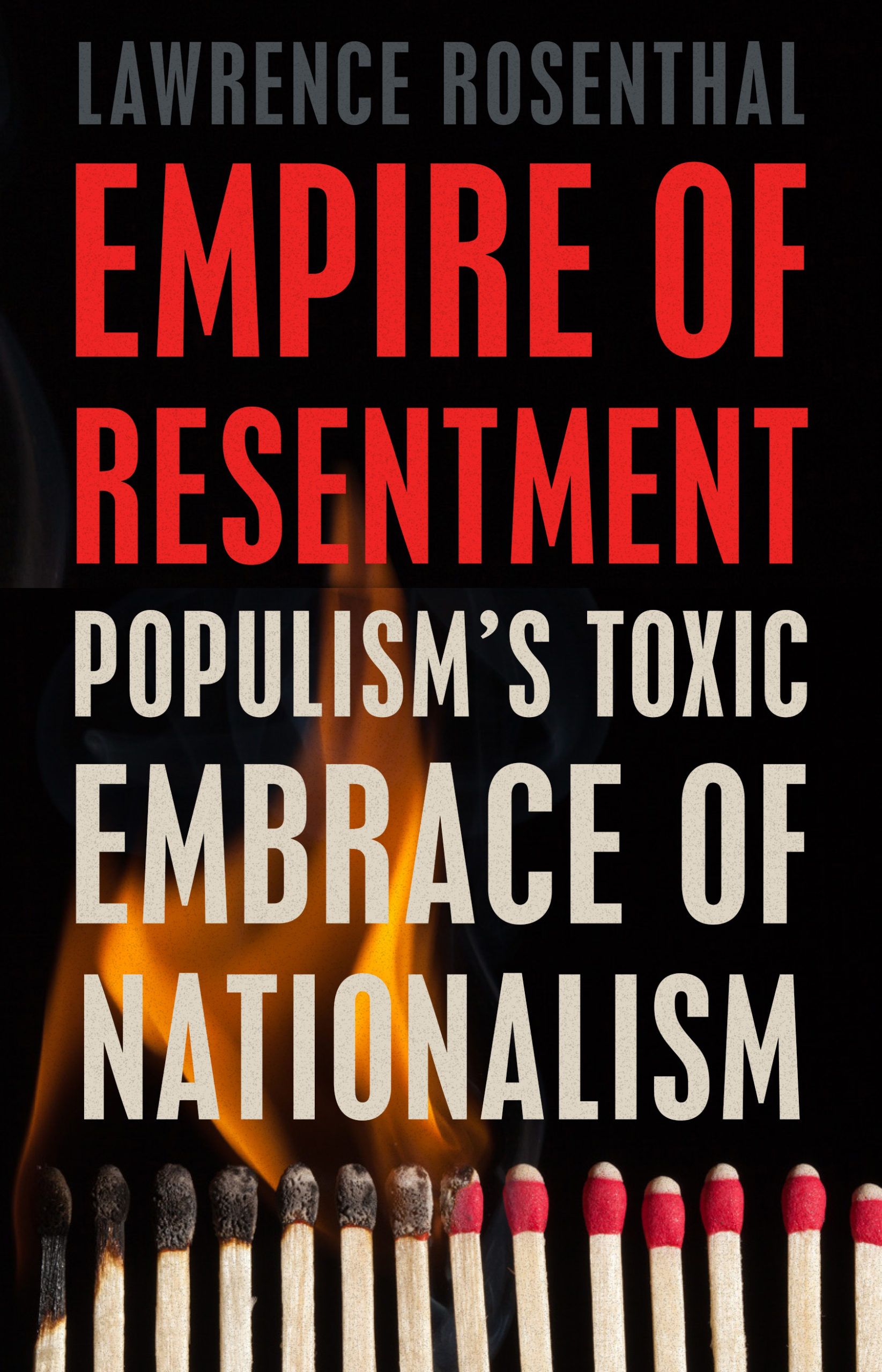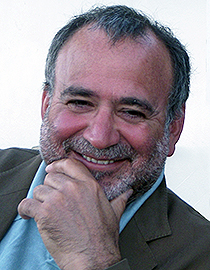Resentment: the emotion that has set fire to U.S. democracy

As the US becomes more diverse, some white voters feel a rising resentment that they could lose power and privileges long taken for granted. That anger finds form in the growing white nationalist movement, says Lawrence Rosenthal, founder of the Center for Right Wing Studies at UC Berkeley. (Photo by Rodney Dunning via Flickr | CC BY-NC-ND 2.0)
Through three years and eight months of his presidency, Donald Trump has seemed to defy the laws of political gravity: Despite myriad scandals, open racial incitement, admiration of dictators, the indictment or imprisonment of his high-level staff, his own impeachment and a widely criticized response to the COVID-19 pandemic, his support among voters has held steady, just north of 40%.
The question is: Why?
In a new book, UC Berkeley scholar Lawrence Rosenthal bores beneath the headlines and tweetstorms to the realm of human emotion and concludes that, to understand this moment in American politics, it is essential to understand one of the most primal emotions of all:
Resentment.

Rosenthal’s new book was released this week. (Image courtesy Lawrence Rosenthal)
In Empire of Resentment (released Sept. 8, 2020, by The New Press), Rosenthal tracks how the razor-edged emotion that animated the conservative Tea Party movement during the presidency of Barack Obama coalesced under Trump into an identity movement that feels dispossessed of its birthright and, at its extreme, descends into aggrieved white nationalism.
“The fierceness of the new identity movement is more about status lost than property lost,” he writes. “It is a loss so profoundly felt that it has generated a fierceness powerful enough to transform U.S. politics — and much of world politics — into a new era.”
Rosenthal is the chair and lead researcher of the UC Berkeley Center for Right-Wing Studies, which he founded in 2009. His aim has been to study right-wing thought and movements as an independent scholar, not as a liberal critic.
In an interview, he traversed the differences between right-wing and left-wing resentment. And he assessed whether the U.S. is drifting toward the model of “illiberal democracy” found today in Hungary under Prime Minister Viktor Orbán — or evolving into something more ominous.
[This interview has been edited for length and clarity.]
Berkeley News: Your book focuses a lot on resentment as a gravitational force in U.S. politics. Who exactly is resentful? And why?

Lawrence Rosenthal, director of the Center for Right-Wing Studies at UC Berkeley (Photo: Jane Gabriel)
Lawrence Rosenthal: Resentment is anger directed at people who seem to be above you. I distinguish between right-wing populism and left-wing populism. Each of them is about resentment toward perceived elites. Left-wing populism tends to be focused on financial elites. Right-wing populism tends to be focused on cultural elites.
Right-wing populism has taken as its focus for a very long time what we could call blue America: Hollywood. University professors. Democratic Party liberalism. It then gets more complicated, because the perception is that these elites have a kind of client base which is regarded as the underclass. It’s quite popular now on the Republican right to appeal to Black voters by saying, ‘You’ve been on the Democratic plantation for too long.’
One of the things that was particularly alarming under President Barack Obama was this sense in right-wing populism that now the underclass was in the elite. That’s how Obama was perceived. In the book, I quote a former policeman who says, ‘The people I was looking for are now running the country.’
When you consider the various factors that contribute to the resentment driving our politics, how important are race and demographic change?
Demographic change is at the heart of the current political environment, and it is intimately connected to the question of race. “Replacement theory” insists that a conspiratorial global liberal elite in country after Western country is plotting to replace traditional populations with immigrants from developing countries. Almost always, these immigrants are Black or dark-skinned. With fears of refugee crises in Europe and the USA since 2015, replacement thinking has galvanized right-wing populists on an unprecedented mass level, everywhere taking advantage of existing national traditions of racism.
Donald Trump emerged to make explicit what had for 40 years been dog-whistle, wink-wink Republican appeals that had turned right populists into the party’s most important electoral base. Trump’s 2016 electoral campaign and his presidency have put this base, and most of the rest of Republican regulars, into a coalition that includes white nationalists and neo-Nazis, groups that previously had not had a role in national politics since the 1930s.
With what has become effectively a new civil rights movement in the wake of the George Floyd protests, Trump, his presidency and his re-election have become the rallying points for what feels to the right to be a last-ditch attempt to turn back the tide — to ‘Make America Great Again.’ Trump has obliged by making the street battles between his favored right militias and a largely imagined counterpart on the left — antifa and anarchists — the dominant narrative of his re-election campaign.
For many conservatives and right-wing populists, having Obama as president — having a Black man as president — was a jarring experience.
Yes, and it coincided with the financial crisis, so the fall of 2008 was this double-whammy. The response was the Tea Party period, which covers the whole of the Obama presidency, and it begins with the adoption of this extreme right-wing economic ideology: As they saw it, the way the liberal world was going to deal with the Great Recession, the way that Obama, et al., would deal with it, would be to take away the economic security in their own lives.
The book argues that this thinking views rights and benefits and freedom as a zero-sum quantity. In this thinking, if there are going to be new benefits like ‘Obamacare,’ the only way it can happen is if they take things from us. Hence, the amazing, oxymoronic signs that we saw in so many of those protests: ‘Government, hands off my Medicare!’
You suggest that conservative populists feel that the culture looks down on them. Don’t they have a point?
They do have a point. There is a sense, in the liberal world, that those are the backward people. Those are the people who are stuck somewhere in a kind of earlier, uglier historical epoch. What I also point out in the book, though, is that once right-wing populism is mobilized, there is this social-psychological flip.
The resentment remains, but it also flips into contempt, so the right-wing world is full of the absolute mirror image of what you’re talking about in the liberal world. Rush Limbaugh for years has opened his show by saying, ‘I have the biggest hypothalamus in America. And I have one half of my brain tied behind me, just to make things fair.’
The idea that liberals are stupid or mentally ill is more explicit than you find in liberal thinking about the right.

In his new book, “Empire of Resentment,” Rosenthal argues that some white conservatives are motivated to resist “liberals … who think they know better than we do and look down on us and want to tell us how to run our lives.” (Photo by Wesley Hetrick via Flickr | CC BY-NC 2.0)
Thinking about right-wing populists — how is it that roughly 40% of voters have stayed behind President Trump despite, as we say, ‘norms being violated’ on an unprecedented scale?
Well, one thing is that ideology is only felt epidermically — it’s skin deep. In 2011, 2012, they said, ‘We will shut down the government because of the deficit! We will default on the national debt because of the deficit!’ Five years later, under Trump, that’s just completely gone. Then, they were willing to shut down the government over building a wall.
The ideological particulars among right-wing populists are fluid. These are, in the end, identity movements. We tend to look at identity movements as movements of women, Black people, brown people, gay people — those who are demanding a seat at the table. They have been locked out of social justice and equality in various ways. So, those are movements of deprivation.
On the other side — it was true in the Tea Party and now even more so under Trump — there is an identity movement among people who feel that they are losing a seat at the table that they have taken for granted, and that they’re being marginalized. It’s an identity movement based on dispossession, on having something taken away.
When the ‘Unite the Right’ march happened in Charlottesville in 2017, there was one chant that really got at this point: ‘You will not replace us!’ And that, in fact, is a point of view of the right populist movements throughout the Western world.
But how is it that the president’s base will go to the extreme of saying climate change isn’t real, or that Russia didn’t intervene in the 2016 election, or that an imagined ‘deep state’ is trying to sabotage the Trump government? How is it that they’re driven into an essentially separate reality?
If one reads the right-wing press, climate change is often argued in this pseudoscientific way, in a way that appears to be credible. The reason that it’s a hoax is, one, that scientists are making a lot of money off this and, two, that it’s a power grab by the liberal world, and that, in a larger sense, the liberals are the people who think they know better than we do and look down on us and want to tell us how to run our lives.
At the end of ‘Empire of Resentment’, you talk about our current psychological environment. You call it ‘a collective miasma, which in some ways approximates a psychiatric condition, a kind of epistemological insanity.’ How is this playing out in our politics and the political campaigns?
I’m writing there about the coining of the term ‘alternative facts’ in the first week of the Trump administration, and then ‘gaslighting’ and ‘post-truth’. We get 20,000 lies, and a focus on how many lies per day?
What I wanted to do was present a coherent telling of this story of alternative facts. When you get bombarded with things that are plainly not the case, it is intellectually exhausting. As we develop in language and in society, we have ideas of how you define something as true, and how you define something as not true. And it’s that capacity to make those distinctions which has been eroded, which has been corrupted.
Does this allow an evolution in the U.S. toward a state that looks like Hungary today?
Hungary has been a democracy since 1990. Its democratic institutions are 30 years old, but they have been eroding. The institutions of democracy in this country are 250 years old. The institutions are much stronger here. You could not have Stephen Colbert on TV in Hungary. You could not have media like PBS in Hungary.
The institutions that need to be taken down for illiberalism to triumph in America are much stronger. They’re not eternal, but illiberalism faces a much deeper slope than it finds in other countries.
You have expressed caution about careless use of the word ‘fascism.’ But after this difficult summer, are you seeing anything that leads you to worry?
Illiberalism occurs on a spectrum, where more and more institutions are undermined. I think there are two major Rubicons that would have to be crossed to get from illiberalism to fascism. One is something that has happened in Hungary, where Prime Minister Viktor Orbán has declared an emergency owing to COVID-19. Now he is able to rule by decree.
We’re not there.
Another fascist Rubicon is private militias. In a classic fascist movement, almost its signature is the marriage of a political party to a private militia. That did not happen during Donald Trump’s 2016 campaign, although he said things at his rallies like, ‘Beat the crap out of him!’ and, ‘That person should go out of here on a stretcher!’
But, plainly, something of that nature is happening now. Trump has managed to use the southern border to develop a cadre of law enforcement, the guys who show up in Washington, D.C., or Portland with no insignia on their uniforms. In a way, this is a militia or a militia-like force within the state.
Then, you have the home-grown militias that have arisen, especially since first the COVID-19 anti-lockdown demonstrations, followed immediately by the post-George Floyd demonstrations. The sense of camaraderie between the government militias and these private militias is very strong.
Have we crossed that Rubicon? I don’t know, but I think toes are in the water.
Does the president himself fit into this dynamic?
In classic fascism, the leaders don’t fit the mold of democratic political culture. It’s something else: The leader is a gift to the nation who has a unique capacity to understand and articulate the needs of the nation. Scholars of fascism have called this ‘the leadership principle.’
The Republican Party has taken a significant step in that direction. The week before the Republican convention, they decided there would be no 2020 platform. Instead, they said the Republican platform is what Donald Trump says it is.
That is a clear, unambiguous statement of the leadership principle. That’s a mini-Rubicon — and it’s been crossed.
tinyurlis.gdu.nuclck.ruulvis.netshrtco.de
